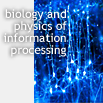Venue

Nordita, Stockholm, Sweden
Scope
In biological systems, proper function crucially depends on dealing with large amounts of information received from a usually noisy environment. Filtering out the noise, finding structure in the incoming information, memorizing this information, and eventually using it for generating proper response are fundamental operations performed by these systems. The scale at which these operations are performed ranges from individual cells to multispecies communities. They are performed in organisms as small as individual cells when they detect changes in environmental conditions and respond to it, when they search for food and when they co-operate with other cells to accomplish a task. In systems made of billions of cells such as the mammalian nervous systems, similar information processing tasks are performed. What is similar amongst all these systems is the detection of patterns and structures in the incoming noisy information, combining it with previous knowledge and making the best decision using this combination.
From a completely theoretical perspective the important questions that one would like to answer are the following. What methods and algorithms can be used to perform these operations? What are the optimality bounds on them? From a more practical perspective one would like to know how these methods can be/are implemented in different biological systems? How close are the biological systems to the theoretical optima?
In this program we gather scientists working on the subject to study:
- Techniques and algorithms that are developed using statistical mechanics to process high dimensional data. These include, but are not restricted to, various exact and approximate algorithms used for fitting statistical models, Bayesian inference and sampling methods.
- The biology of information processing in organisms, importantly in large scale neuronal networks. This part involves both experimental and theoretical work.
- The application of statistical mechanics techniques for analyzing high-throughput experimental data collected form neuronal and genetic networks and the implementation of learning and inference algorithms in biological systems
Invited Participants (incomplete)
|
|
Application
If you want to apply for participation in the program, please fill in the application form. You will be informed by the organizers shortly after the application deadline whether your application has been approved. Due to space restrictions, the total number of participants is strictly limited.
Application deadline: 4 March 2012
A minimum stay of one working week is required and we encourage participants to stay for a period of at least two weeks.
There is no registration fee.
Travel Reimbursement
PhD students and young Postdoc fellows are eligible for travel grants to participate in the program. If you are interested in such a grant, please mark the corresponding field in the application form, briefly summarize your interest in the program in the comments field, and indicate an estimation of your expected travel expenses. Since only a limited number of grants is available, decision concerning the grants will be made on a case-by-case basis and you will be notified shortly after the application deadline.
Accommodation
Nordita provides a limited number of rooms in the Stockholm apartment hotel BizApartments free of charge for program participants.

